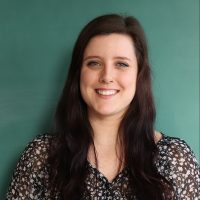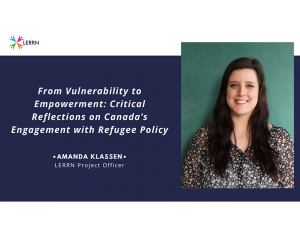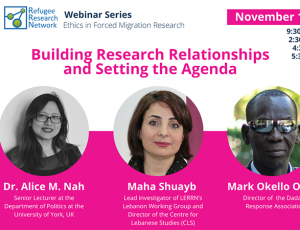
Amanda Klassen
Project Officer
| Degrees: | M.I.P.P. (Balsillie School of International Affairs), B.A. (Wilfrid Laurier) |
I am a fourth-year PhD Candidate in Political Science at Carleton University working under the supervision of Dr. James Milner and specializing in International Relations and Gender and Diversity. Using a critical feminist approach, my research focuses on the emergence and implementation of global norms relating to the protection of refugee women and girls. My project highlights that, despite 30 years of attention to the protection needs of women and girls, the inclusion of gendered perspectives in global policy has been limited. Likewise, these norms have not manifestly resulted in changes in the ability of refugee women to access these protections. I argue that one way to understand the gap in what is supposed to happen and what actually does, relates to how the norm is implemented, by whom, and who determines when, in fact, it has been implemented. As such, I explore the factors that influence the way that individuals (refugee women) participate in the defining and implementation of such global norms. I hope to demonstrate that refugee women must be included in these processes in order for such protection norms to be truly transformative.
I was most interested in becoming involved as a student researcher with LERRN because I am passionate about improving circumstances for refugees, and ensuring that refugee participation is encouraged, and supported in all stages of research and policy making. Because LERRN places such a strong emphasis on collaboration with partners in the Global South, meeting their research needs, and the inclusion of refugee voices, I felt that working with LERRN was a great opportunity to use my theoretical training in a practical way.
As part of my research with LERRN I have published two working papers alongside Dr. Milner. “From theory of change to SMART pledges: Lessons for pledges at the Global Refugee Forum and beyond”, was written ahead of the Global Refugee Forum in 2019 to provide guidance on making funding pledges that will have meaningful positive impact; and, “Civil Society and the Politics of the Global Refugee Regime” is a contribution to the UNHCR’s State of the World’s Forcibly Displaced project. In 2020 I published a blog for International Women’s Day 2020 “An Equal World is an Enabled World: Reflections on Gender Equality in Refugee Contexts” which emphasized the importance of including the voices of refugee women in the fight for equality and empowerment. My current research projects focus on the rhetorical shifts away from the language of vulnerability towards empowerment in refugee policy making.


